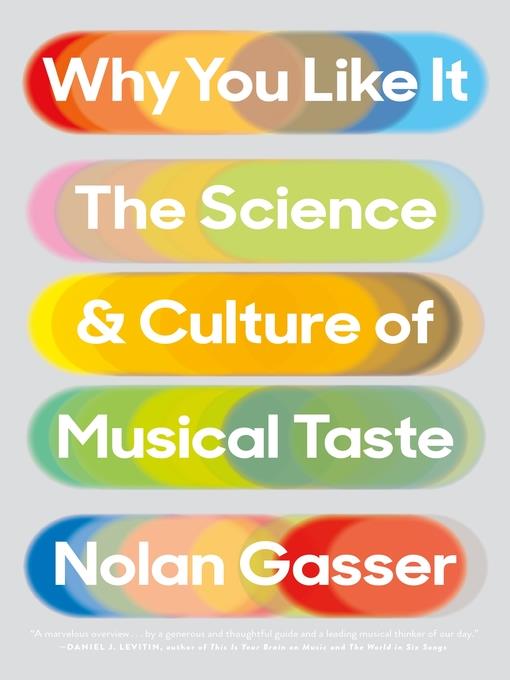
Why You Like It
The Science and Culture of Musical Taste
کتاب های مرتبط
- اطلاعات
- نقد و بررسی
- دیدگاه کاربران
نقد و بررسی

March 11, 2019
The mystery of why music moves people gets a stimulating survey in this expansive treatise. Musicologist and composer Gasser, who headed Pandora Radio’s Music Genome Project, investigates how music’s objective properties underlie subjective preferences in a deep dredge that covers the physics of sonic vibrations; principles of melody, harmony, and rhythm; the science of how the brain processes music and connects it with emotions; sociological theories of musical preferences, class, and fan subcultures; and a disquisition on biology and “the conceptual link between pluripotent stem cells and theme and variation.” Woven in are analyses of musical genres—pop, rock, jazz, hip-hop, electronica, world music, and classical—with exegeses of representative scored examples. (An ability to read music will help in understanding these sections.) Gasser’s writing is passionate and generally accessible, though he sometimes stumbles over the inherent difficulty of conveying music through musicology. (A discussion of Creedence Clearwater Revival’s “Proud Mary” notes the “unusually small ambitus (range)—only a 5th (B-F-sharp), with most of it limited to the top 3rd (D-F-sharp)” before suggesting “there may just be something about that simple, bayou groove that keeps its fans... coming back.”) The book is a sprawl, but serious music lovers will find much fascinating science and lore to browse.

Starred review from March 1, 2019
A sprawling, packed-to-the-brim study of the art and science of music, as monumental and as busy as a Bach fugue.Why does one person like the Rolling Stones and another like Celine Dion? Why does anyone like the Eagles? Are there human universals at play in musical preferences? Gasser, the polymathic mind behind Pandora Radio's Music Genome Project, probes the "sources, nature, and implications of our own, personal musical taste," a taste that cannot always be easily reduced to buy- or listen-next algorithms. Music has features that are essentially invariant among human cultures: It is shaped by rhythm, "the overriding parameter wherein the listener gains an intuitive understanding of the music as a whole," and it comprises melody, harmony, and other sonic elements. But more individually, our musical taste is shaped by all sorts of factors, socio-economic and psychological, that sometimes anticipate and sometimes follow "our membership in intracultures," whether goth or mod or lite-classical. Gasser's overarching aim is not just descriptive. In his forays into all imaginable corners of the musical world, he seeks to soften prejudices and broaden horizons, posing exercises and suggestions such as identifying syncopation in hip-hop tunes and appreciating the power of pre-Islamic chants sung by Saharan women "aimed at bringing the listener into a state of ecstasy." The author's body of examples--backed by a vast online site--is fittingly broad-ranging, featuring tunes from "Old MacDonald" to "Lucy in the Sky with Diamonds" and Leonard Bernstein's Candide overture, all of which have something to say about why we like what we like. And while there's no disputing taste, as the old Latin tag has it, there is much to know about how our psyches play in our musicality, what recreational drugs can contribute to the enjoyment of a Grateful Dead song, and the many ways in which music can make us better and happier people.Like Nathan Myhrvold's like-minded explorations of cooking, Gasser's enterprise has a pleasingly mad-scientist feel to it, one that will attract music theory geeks as much as neuroscientists, anthropologists, psychologists, and Skynyrd fans.
COPYRIGHT(2019) Kirkus Reviews, ALL RIGHTS RESERVED.

Starred review from May 1, 2019
Why do we all love music so much, whatever our particular tastes? Where do our musical tastes come from, anyway? What makes some people love Beethoven and others want to tell him to roll over, even as cultures worldwide can identify the same piece as happy or sad? And what does our favorite music say about us? Chief architect of Pandora Radio's Music Genome Project (that's the engine that recommends songs), Gasser answers all your questions while teaching you to be a better listener.
Copyright 2018 Library Journal, LLC Used with permission.

May 1, 2019
Why do we all love music so much, whatever our particular tastes? Where do our musical tastes come from, anyway? What makes some people love Beethoven and others want to tell him to roll over, even as cultures worldwide can identify the same piece as happy or sad? And what does our favorite music say about us? Chief architect of Pandora Radio's Music Genome Project (that's the engine that recommends songs), Gasser answers all your questions while teaching you to be a better listener.
Copyright 2018 Library Journal, LLC Used with permission.

























دیدگاه کاربران